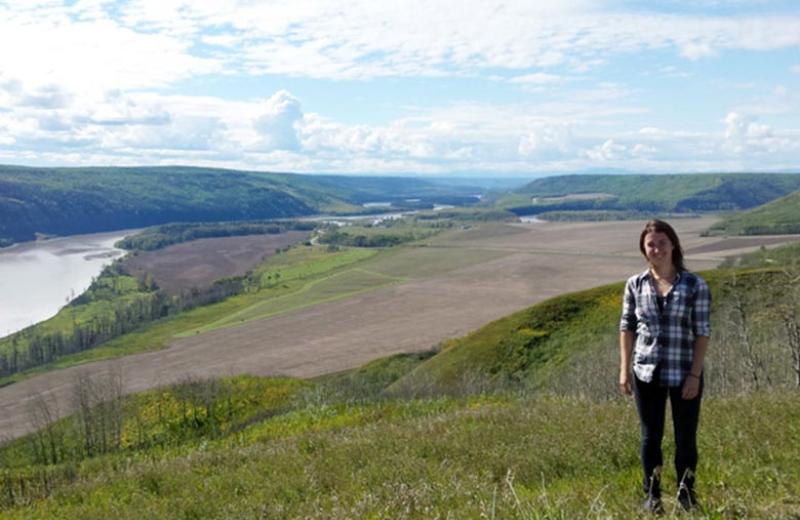Robyn Turner never thought she would have the career she’s had working as a clinical dietitian in Vanderhoof. Learn what it’s like to work in a rural Northern BC community and what kind of work she’s most passionate about.
Tell me about your career as a dietitian.
I never really anticipated coming to the North, let alone a rural community. My career turned out different than what I first had in mind. Nonetheless, it’s been very exciting!
By taking the opportunity to come North, I’ve been able to be myself as a dietitian and get my feet wet in a lot of areas – including working with individuals admitted to hospital through one-on-one nutrition counselling, and those living in complex care.
I’ve been able to use creativity and initiative to improve nutrition in my area, and because it’s not as congested here in Vanderhoof, I can do more things than I could in a bigger centre. When I was just starting as a dietitian, I thought I would be working casual for a few years, filling temporary roles, and then naturally work in a specific area. That’s definitely not the case with my work now, which I enjoy. I like being able to do a little bit of everything.
What’s your take on what dietitians do?
A dietitian supports individuals where they’re at in reaching their health goals. Doesn’t matter if they’re told to go see a dietitian or are self-motivated to change something about their health. Wherever they’re at, a dietitian is there to help support them and achieve their goals to improve their overall health.
Could you describe a day in your life as a dietitian?
There is no “regular” day. Generally my day starts with rounds, or I might go to another community. In a day I may see someone for a diabetes consultation, or modify a tube feed or do a swallow assessment. Sometimes I see children who are having challenges with eating or chronic constipation. My day always varies!
I pull a lot of areas of nutrition together when I’m working. I never know if I’m going to be doing acute care, or focusing on quality and enjoyment of life in complex care, or advocating for someone. I have to be ready to use all my nutrition knowledge. Sometimes I’m pulled into community practice meetings, quality improvement initiative meetings with the hospital kitchen staff, or community projects with schools or local First Nations.
For example, I was working on a family food skills project at the Men’s Shed in Vanderhoof. The Shed is a space for men in the community with a kitchen and a place to hang out. I was part of a food skills program there for men who were living alone for the first time or had partners with a change in health. These men were all of a sudden having to cook for themselves for the first time and didn’t know where to start. If people don’t have food skills, it’s something they need to build. Building those food skills is something I’m really passionate about.
Basically in my job you never know what hat you’re going to be wearing – it could be a counselor or advocate hat or a clinical dietitian hat. It’s always different, which keeps it exciting.
What’s one thing someone might not know about your role?
People often don’t realize that advocacy is a big part of my job. I’m not always seeing individuals one-on-one. I spend a lot of time helping people understand nutrition issues. My role involves a lot of nutrition awareness and advocacy. There’s a lot of collaboration and quality improvement involved in the different health improvement projects I’m a part of. If there’s a primary care community project focused on health and I don’t go – that’s a big part of health that’s not present. I represent nutrition and health and can provide education to other people on my health care team.
What part of your role is the most rewarding?
When you have those moments of success – those clients who are dedicated to change, who come to all their appointments with you, and take your recommendations and apply them to their life and see positive results in their health – that’s rewarding. It might take six months or a year for them to see those results. When you have clients who can get off medications or see their numbers come down – that’s when you know the stuff you’re saying and the recommendations you’re giving are working.
It’s nice too, when there are people in the community that show appreciation for my work, especially in a small town. I’ve had people recognize and draw on the importance of my role. There’s also a lot of doctors I work with who are appreciative and will advocate for me. When I came to the North I didn’t expect to have as much interaction with doctors as I do. They’re present and invested and actually want to hear my opinion. Overall, it’s been great being in Vanderhoof. Three years later and I’m excited to see where else I can go in this job!
How to see a registered dietitian
Do you think you, your patients, or someone you know could benefit from talking to a dietitian?
- There are dietitians in various communities across Northern Health – you might need a referral. Talk to your health care provider to learn more.
- BC residents can also access Dietitian Services at HealthLink BC, by calling 8-1-1 (or 604-215-8110 in some areas) and asking to talk to a dietitian.














Comments